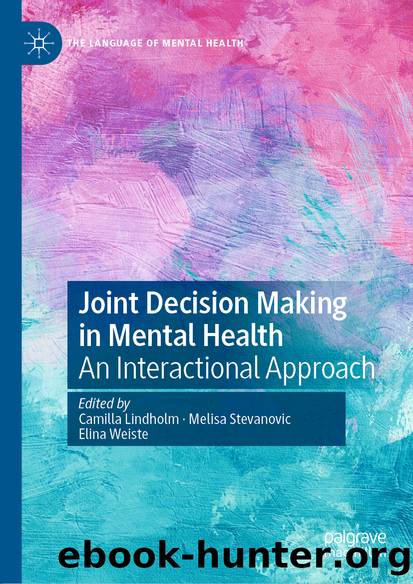Joint Decision Making in Mental Health by Unknown

Author:Unknown
Language: eng
Format: epub
ISBN: 9783030435318
Publisher: Springer International Publishing
Discussion
Clients’ orientation to psychiatrists’ professional authority has been proposed as a possible reason for their reluctance to participate actively in decision-making. To investigate whether and how clients’ behaviors in actual decision-making reflect this orientation, this study has examined clients’ practices for resisting treatment recommendation in Japanese outpatient psychiatric consultations. It has described practices used by clients to resist a recommendation and has shown how they shape decision-making in different ways: withholding acceptance does not display any grounds for resistance and completely leaves it to the psychiatrist to choose how to proceed with the decision-making; questioning the recommendation narrows down problematic aspects of the recommendation and solicits the psychiatrist’s explanation about those aspects; revealing a reason for the resistance explicitly conveys grounds for resistance and invites the psychiatrist to reconsider the recommendation in terms of the manageability of the reason for resistance; and describing additional concerns suggests the prematurity of the recommendation and invites the psychiatrist to take into consideration some additional aspects of the client’s problem in proceeding with the decision-making.
What is common to these practices is that clients resist the recommendation without explicitly challenging the psychiatrist’s authority. Clients either display their subordinate epistemic stance toward the matter when they focus on something that falls within the psychiatrist’s knowledge domain or avoid intruding into the psychiatrist’s epistemic territory by formulating possible obstacles for accepting the recommendation as something that falls within their own epistemic territory. Clients thus consistently display respect to psychiatrists’ authority even though they resist their recommendations. In a sense, this finding is compatible with the argument put forward in previous studies, that because clients have a fear of being regarded as “difficult,” they avoid a gamble that might threaten their future relationship with the psychiatrist (Frosch et al., 2012; Joseph-Williams et al., 2014).
However, this study has also provided evidence that clients’ behaviors in actual decision-making are not necessarily characterized by “passivity and compliance” (Joseph-Williams et al., 2014, p. 1). Rather, clients have been shown to exert agency in navigating treatment discussions toward an outcome that reflects their preference and concerns. Clients typically start resisting by withholding acceptance, which is the weakest form of resistance in shaping the subsequent interaction. When an acceptable recommendation does not subsequently emerge, however, the client uses practices such as questioning the recommendation, revealing a reason for the resistance, or describing additional concerns, each of which then shapes the subsequent interaction in a specific way. By ordering their practices for resistance in this way, clients adjust the agency they exert for each sequential environment such that they minimize the risk of being regarded as challenging the psychiatrist’s authority, while simultaneously maximizing the chance that the resulting recommendation will become more sensitive to their concerns. In this study, we have demonstrated that the previous findings on clients’ resistance in other medical settings (Barton et al., 2016; Costello & Roberts, 2001; Koenig, 2011; Stivers, 2005, 2007) basically hold for routine outpatient psychiatric consultations as well. In addition, it has enhanced our understanding of clients’ resistance
Download
This site does not store any files on its server. We only index and link to content provided by other sites. Please contact the content providers to delete copyright contents if any and email us, we'll remove relevant links or contents immediately.
Should I Stay or Should I Go? by Ramani Durvasula(6792)
Why We Sleep: Unlocking the Power of Sleep and Dreams by Matthew Walker(5650)
Fear by Osho(4089)
Flow by Mihaly Csikszentmihalyi(4058)
Rising Strong by Brene Brown(3785)
Why We Sleep by Matthew Walker(3778)
Too Much and Not the Mood by Durga Chew-Bose(3697)
How to Change Your Mind by Michael Pollan(3681)
The Hacking of the American Mind by Robert H. Lustig(3584)
Lost Connections by Johann Hari(3458)
He's Just Not That Into You by Greg Behrendt & Liz Tuccillo(3305)
Evolve Your Brain by Joe Dispenza(3056)
What If This Were Enough? by Heather Havrilesky(2946)
Resisting Happiness by Matthew Kelly(2890)
Crazy Is My Superpower by A.J. Mendez Brooks(2863)
The Courage to Be Disliked by Ichiro Kishimi & Fumitake Koga(2804)
The Book of Human Emotions by Tiffany Watt Smith(2775)
Descartes' Error by Antonio Damasio(2740)
In Cold Blood by Truman Capote(2688)
